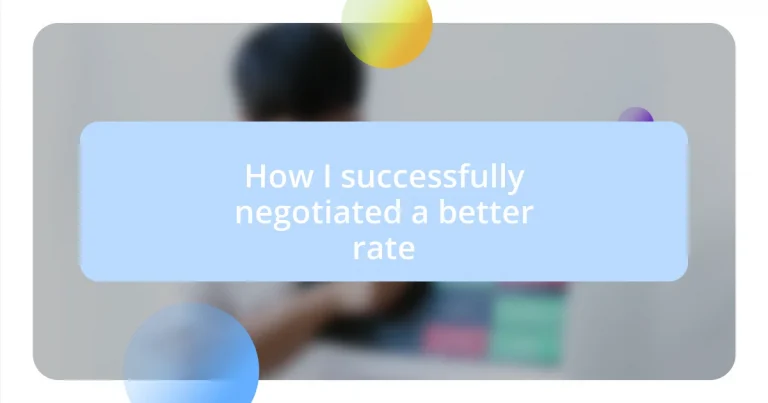Key takeaways:
- Preparation is crucial: Research market trends and understand the other party’s perspective to foster a collaborative atmosphere.
- Effective communication: Use clarity, active listening, and a positive demeanor to enhance dialogue and build rapport.
- Embrace flexibility: Be open to unexpected solutions and maintain emotional control to navigate challenges and close deals successfully.
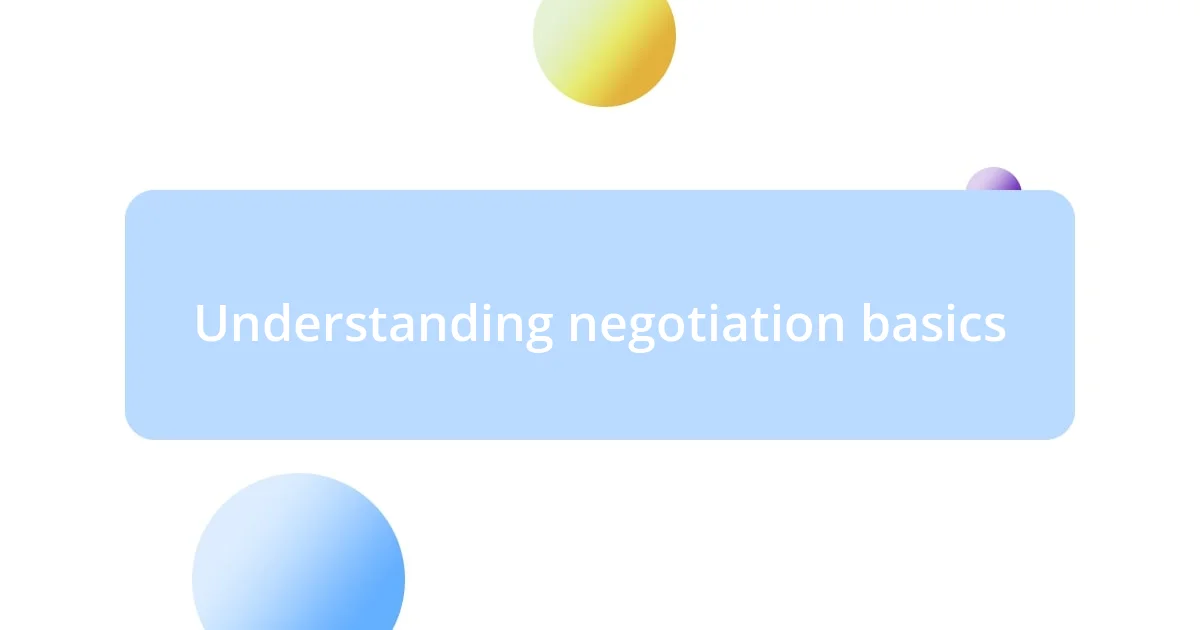
Understanding negotiation basics
Negotiation is an art, not just a simple exchange of offers. I remember when I first approached a vendor about a rate increase; I felt a knot in my stomach, unsure if I could secure a better deal. Understanding that both parties aim for a win-win outcome was crucial—it shifted my mindset from fear to collaboration.
Having a clear idea of your goals before entering negotiations is essential. I learned this the hard way during a salary discussion where I hadn’t outlined my desired figure; the result was a mediocre offer that didn’t reflect my true worth. Can you imagine walking away from a conversation feeling undervalued? It’s uncomfortable, right? Setting clear objectives provides direction and strengthens your confidence.
Listening is just as vital as articulating your position; it’s a two-way street. I once sat across the table from a colleague who shared their concerns about budget constraints. Instead of dismissing their worries, I acknowledged them, and that led to a more productive exchange where we found common ground. How can you truly negotiate effectively if you’re not tuned into the other person’s needs? Emphasizing empathy allows both sides to feel understood, paving the way for creative solutions.
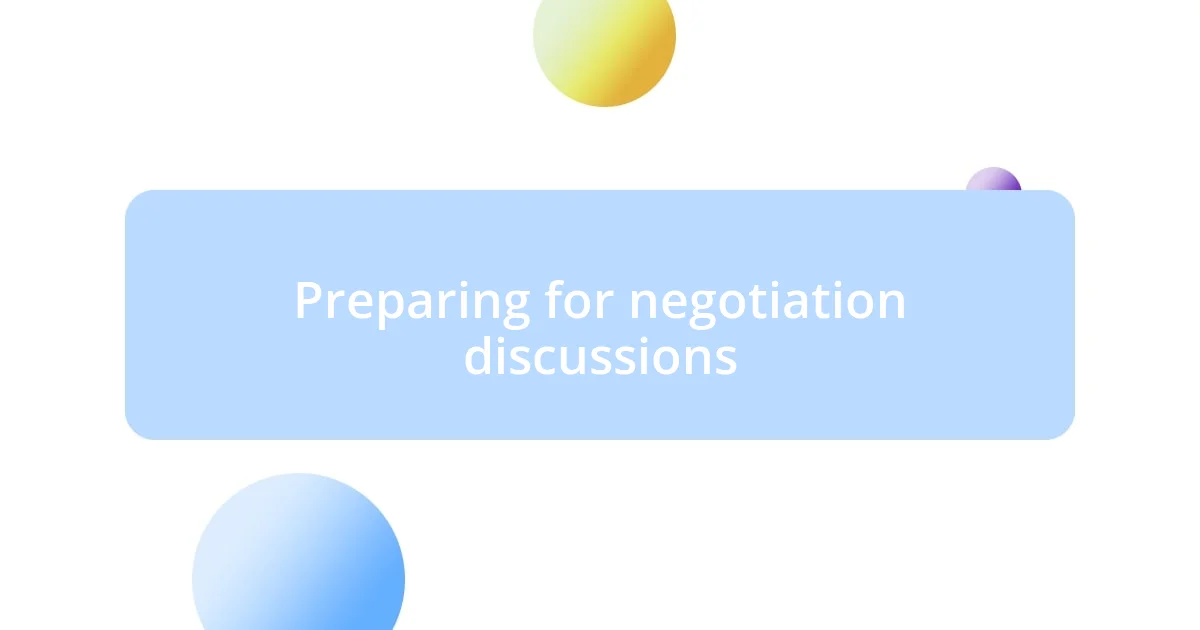
Preparing for negotiation discussions
Preparing for negotiation discussions starts with comprehensive research. I always make it a point to gather as much data as possible about the topic at hand. For example, when I was negotiating service rates, I dug deep into market trends and competitors’ prices. This preparation not only equipped me with facts but also gave me the confidence to back my requests with compelling evidence. Don’t you feel more empowered when you’re well-informed?
Understanding the other party’s perspective is equally important. I remember a time when I focused solely on my needs without considering my counterpart’s position. This oversight led to a stalemate. A little while later, I decided to learn more about their objectives and constraints. This shift made our discussion more collaborative, paving the way for a deal that benefited us both. It’s fascinating how empathy can transform what seems like a confrontation into a partnership.
Finally, practicing your negotiation dialogue can be a game changer. I once role-played the discussion with a friend, which helped me refine my arguments and consider possible objections. It felt a little awkward at first, but the insights gained were invaluable. Have you ever tried practicing your conversation ahead of time? It can really sharpen your approach and boost your confidence as you step into that negotiation room.
| Preparation Strategy | Description |
|---|---|
| Research | Gather data on market trends and competitors to support your arguments. |
| Understand the Other Party | Consider the needs and constraints of the other side to foster collaboration. |
| Practice Dialogue | Role-play key conversation points to refine your approach and build confidence. |

Researching market rates and trends
Researching market rates and trends is a foundational step I never overlook. There’s something incredibly invigorating about diving into data that relates to your negotiation. For instance, when I was discussing service rates with a vendor, I started by mapping out what competitors were charging. It was surprising to see significant variances in pricing. Being armed with this information not only strengthened my position but also opened my eyes to what others in the industry accepted as standard.
- Analyzing industry reports and publications to gauge prevailing rates.
- Utilizing online pricing tools or platforms for real-time data.
- Networking with peers to gain insights from firsthand experiences.
- Tracking seasonal trends that may influence pricing adjustments.
Through these strategies, I realized that researching market trends not just informed me but also provided a sense of confidence—it’s like stepping onto the playing field with a clear playbook. Each piece of data felt like a safeguard that would allow me to negotiate with purpose and clarity.
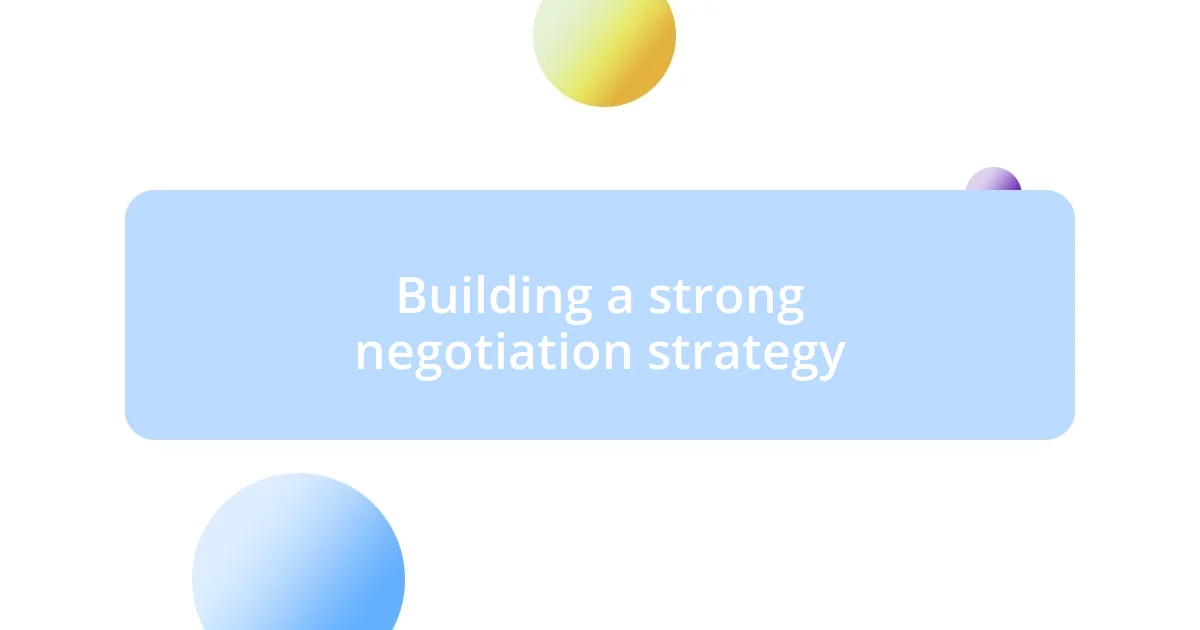
Building a strong negotiation strategy
Building a strong negotiation strategy hinges on preparation and self-awareness. When I think back to one of my negotiations, I can’t help but recall how pivotal it was to define my goals clearly. I jotted down what I wanted, but I also noted what I was willing to compromise on. This way, when I faced tough questions, I had a roadmap to guide my responses. Have you ever experienced that moment when you realize you’re not just reacting but genuinely driving the conversation? It’s empowering.
Another key aspect I find invaluable is fostering a collaborative atmosphere. During one particularly challenging negotiation, I made a conscious effort to create rapport before diving into my main points. I asked open-ended questions about the other party’s challenges and priorities, which not only eased tensions but also revealed new angles I hadn’t considered. That feeling of uncovering common ground is a thrill; it shifts the negotiation from a battle to a joint venture. Have you had a moment when a simple question changed the entire direction of a conversation?
Finally, I’ve found that staying flexible during negotiations can lead to unexpected opportunities. In one instance, as I was presenting my case, the other party proposed an alternative solution that I hadn’t considered. Instead of firmly sticking to my script, I took a moment to assess it. This openness not only strengthened our dialogue but also led to a creative solution that satisfied both parties. It’s amazing how staying adaptable can turn a rigid negotiation into an innovative partnership. Have you ever let go of your expectations and been pleasantly surprised by the outcome?
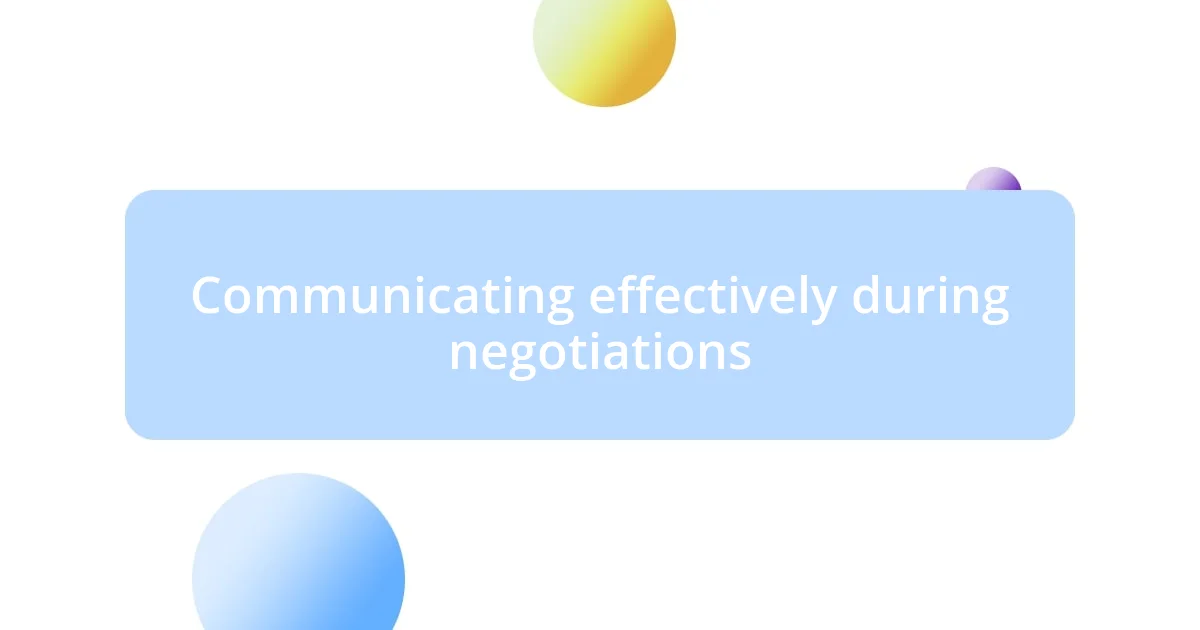
Communicating effectively during negotiations
When it comes to communicating effectively during negotiations, clarity is key. I recall a time when I found myself in a negotiation where the other party seemed to misunderstand my points. I decided to pause and rephrase my concerns more simply, and it was like turning on a light bulb for both of us. Have you ever noticed how just a slight change in your wording can shape the entire tone of an interaction?
Active listening is another crucial element I swear by. During one negotiation, I made a conscious effort to not only hear the other party but also validate their feelings. I nodded, mirrored their expressions, and occasionally summarized their points to show I was engaged. This approach transformed our conversation into a genuine dialogue, easing the tension significantly. It’s fascinating how feeling heard can pave the way for more honest exchanges, don’t you think?
Lastly, maintaining a positive demeanor can profoundly impact the outcome. I remember negotiating with a potential client who initially seemed critical of my proposals. Instead of becoming defensive, I responded with enthusiasm and a solution-focused mindset. I offered alternatives rather than dwelling on setbacks, and the energy shifted in our discussion. It’s incredible how resilience in our tone can invite collaboration instead of resistance. How do you keep your spirits high when faced with skepticism?
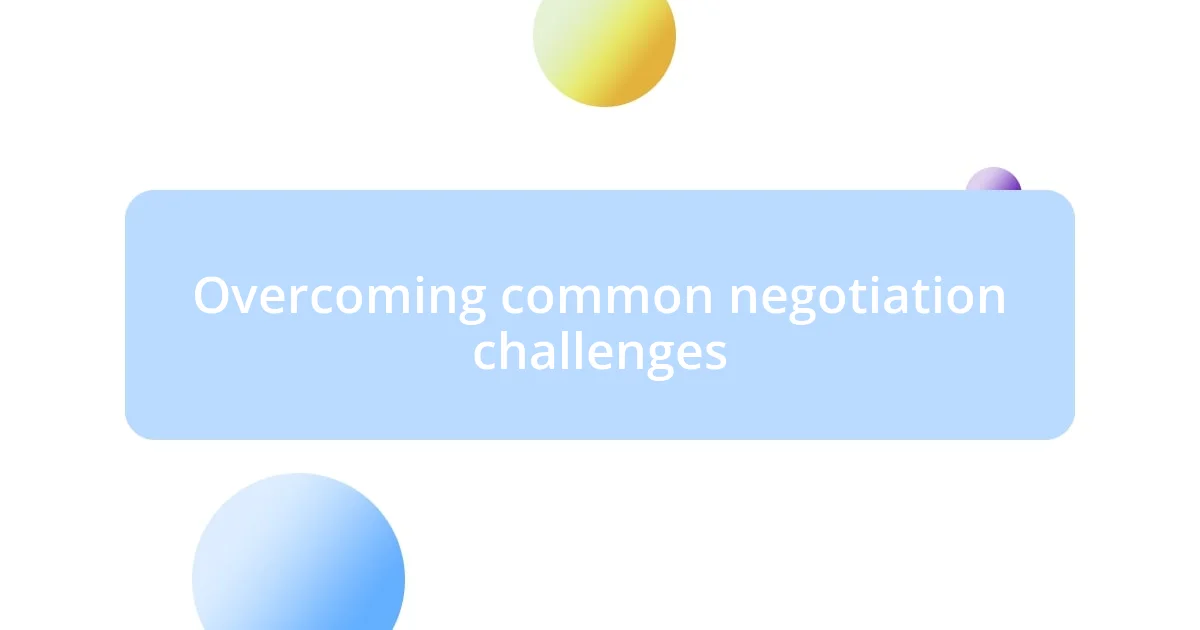
Overcoming common negotiation challenges
One common challenge in negotiations is the fear of rejection. I’ve encountered this many times, especially when proposing a rate increase. My heart would race, and the words felt like they were stuck in my throat. However, facing that fear head-on was crucial. I reminded myself that the worst thing I could hear was “no,” and that it wouldn’t be the end of the world. Have you felt that knot in your stomach before? It’s natural, but I’ve learned that embracing those nerves often leads to more authentic conversations.
Another hurdle can be dealing with differing expectations. There was a situation where the other party had a vastly different timeframe in mind for a project. I initially felt frustrated but realized that this was an opportunity. Instead of pushing my agenda, I asked questions to understand their timeline better. That dialogue opened doors, revealing a compromise that worked for both of us. It’s amazing how shifting from frustration to curiosity can change the game, isn’t it?
Finally, managing emotions—both mine and the other party’s—can be daunting. I recall a negotiation that started off dispassionately but quickly escalated into heated exchanges. In that moment, I took a step back and suggested a short break. That simple pause allowed us to process our feelings and return with a clearer perspective. I discovered that negotiating is not just about the points raised but also about the emotions involved. Have you ever noticed how a little space can lead to a more productive conversation? It’s all about re-centering ourselves amidst the storm.
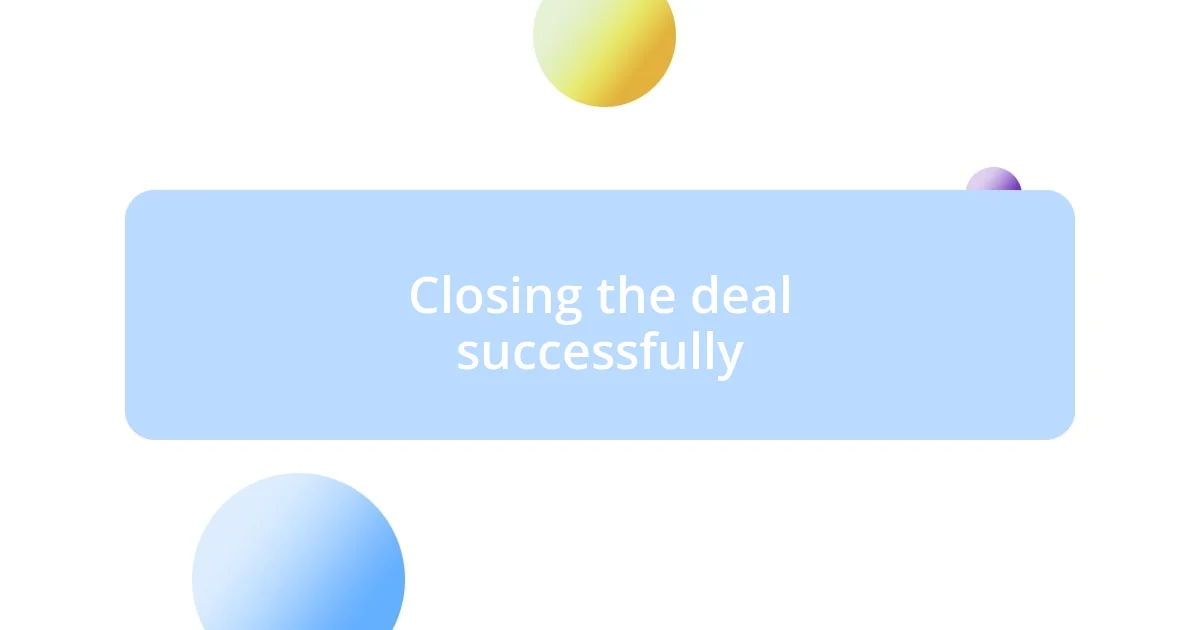
Closing the deal successfully
Closing a deal successfully often boils down to finding common ground. I remember one negotiation that felt stuck in the mud, leaving both parties frustrated. I suddenly shifted gears and suggested a brief brainstorming session. It was in that relaxed, collaborative atmosphere that we uncovered mutual benefits that had gone unnoticed. Isn’t it interesting how a slight change in approach can shift the entire dynamic of a negotiation?
Another powerful moment comes from the importance of timing. There was a particularly tense negotiation where I could sense the other party was overwhelmed. Instead of pushing my agenda, I took a moment to step back and asked if we could pause for a brief discussion over coffee. That small break changed everything. We were able to reconnect on a personal level, helping us return to the table with renewed energy and a clearer focus. Have you ever found that taking a step back can spark a breakthrough in understanding?
Finally, don’t underestimate the power of a well-timed affirmation. During a negotiation about a contract extension, I found myself genuinely admiring my counterpart’s previous achievements. I took a moment to express my appreciation, and suddenly the atmosphere transformed; the tension lifted, and we both began to see possibilities rather than obstacles. It makes me wonder—how often do we let a simple acknowledgment pave the way to success?












